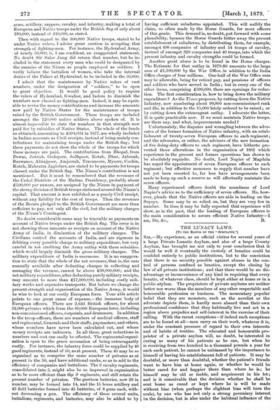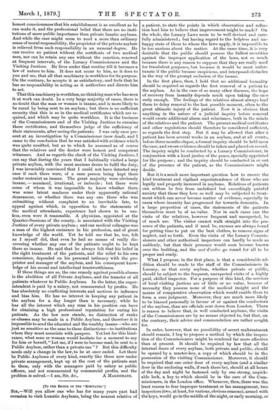• THE LUNACY LAWS.
(To THE EDITOR OF THE "SPECTATOR.") SIR,—My experience, as an official visitor for several years of a large Private Lunatic Asylum, and also of a large County Asylum, has brought me not only to your conclusion that it would be well if eventually the custody of lunatics could be confided entirely to public institutions, but to the conviction that there is no security possible against abuses in the con- trol of persons confined as lunatics, except the closing by law of all private institutions ; and that there would be no dis- advantage or inconvenience of any kind in requiring that every lunatic, of whatever class, should be kept either at home or in a public asylum. The proprietors of private asylums are neither better nor worse than the members of any other respectable and honourable profession or business. The momentary popular belief that they are monsters, such as the novelist or the advocate depicts them, is hardly more absurd than their own professional confidence that they habitually live and act in a region above prejudice and self-interest in the exercise of their calling. With the rarest exceptions—if indeed such exceptions are to be found at all—men carry on their work, whatever it is, under the constant pressure of regard to their own interests and of habits of koutine. The educated and honourable pro- prietor of a private asylum will, no doubt, be interested in curing as many of his patients as he can, but when he is receiving from two hundred to a thousand pounds a year for each such patient, he cannot be unbiassed by the importance to himself of having his establishment full of patients. It may be doubtful, or more than doubtful, whether the patient's friends want to have him at home again, or whether he would be better cared for and happier there than where he is ; he himself may be old or feeble, and acquiescent in his lot; and is it conceivable that the decision whether he shall be sent home as cured or kept where he is will be made without bias (when perhaps the slightest bias will turn the scale), by one who has not only a strong pecuniary interest in the decision, but is also under the habitual influence of the
honest consciousness that his establishment is as excellent as he can make it, and the professional belief that there are no insti- tutions of more public importance than private lunatic asylums. And while the case might seem to need a more than ordinary sense of moral responsibility, the proprietor of the private asylum is relieved from such responsibility in an unusual degree. He can receive no patient without the certificate of two medical men, nor can he retain any one without the sanction, renewed at frequent intervals, of the Lunacy Commissioners and the Visiting Justices. He lives under that routine till it becomes a law of nature to him. It does not occur to him, as it does to you and me, that all that machinery is worthless for its purpose. On the contrary, he accepts it as satisfactory, and feels that he has no responsibility in acting as it authorises and directs him to act.
That this machinery is worthless, no thinking man who has seen it at work can doubt. In a very large majority of cases, there is no doubt that the man or woman is insane, and is more likely to be cured by being sent to an asylum ; but there is no sufficient security that this is so in the medical certificates which are re- -quired, and which may be quite worthless. It is the business of the Commissioners and of the Visiting Justices to examine -these certificates, and themselves judge of the sufficiency of their statements, after seeing the patients. I was only once pre- sent at an investigation by a Commissioner (now dead), and I came to the conclusion that he was satisfied with evidence which was quite unsifted, but as to which he assumed as of course that the relatives and the doctor were honest and competent witnesses. And as regards the check of the Visiting Justices, I can say that during the years that I habitually visited a large private asylum, with the most anxious desire to fulfil the duty, I was invariably convinced that I could not have detected any case if such there were, of a sane person being kept there under restraint as insane. The great majority were obviously insane, — maniacal, irrational, or imbecile ; but there were some of whom it was impossible to know whether there was some latent madness under their apparently rational -demeanour, or whether there was any one there who was submitting without complaint to an inevitable fate, to appeal against which, in opposition to the statements of -the medical attendants, experience had shown to be use- less, even were it reasonable. A physician, appointed at the Quarter-Sessions of the county, is associated with the Visiting Justices of every private asylum ; and our medical colleague was a man of the highest eminence in his profession, and of great knowledge of the world. Yet he told me that he, too, felt as I myself did, that even he had no means of really dis- covering whether any one of the patients ought to be kept there as insane. He said that he always felt that his belief in the right treatment of the patients, and the relief to his own conscience, depended on his personal intimacy with the pro- pietor and manager of the asylum, and his consequent know- ledge of his moral and intellectual trustworthiness.
If these things are so, the one remedy against possible abuses is the abolition of all Private Asylums, and the transfer of all patients whatever to Public Asylums. In the latter, the super- intendent is paid by a salary, not remunerated by profits. He has absolutely no conflicting interests and motives to influence and bias him. He has no interest in keeping any patient in the asylum for a day longer than is necessary, while he has all the interest which any man in his position can have for obtaining a high professional reputation for curing his patients. As the law now stands, no distinction of ranks or classes may be made in a Public Asylum, and therefore it is impossible to send the educated and the wealthy insane—who are just as sensitive as the sane to these distinctions—to institutions -where they must associate with paupers. Yet but for this hind- rance, what man or woman would hesitate for a moment to say for him or herself, "Let me, if I were to become mad,'be sent to a Public Asylum, rather than a private one " ? But this difficulty needs only a change in the law, to be at once ended. Let there be Public Asylums of every kind, exactly like those now under private management, kept up at the cost of the patients sent to them, only with the managers paid by salary as public officers, and not remunerated by commercial profits, and the problem is solved.—I am, Sir, &c., A MAGISTRATE.



































 Previous page
Previous page